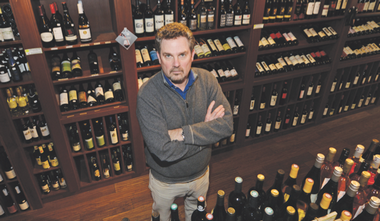Victoria’s plan to standardize wholesale discounts for all of the BC’s liquor retailers will harm wine store owners and potentially put them out of business.
“Our model is effectively gone,” said Liberty Wine Merchants owner Robert Simpson. “We were counselled through the years and regulated in a way to develop our business in a certain manner, which we did. Now, all of a sudden, it’s changed.”
Four of Simpson’s six Metro Vancouver stores operate under licences that enable him to buy wine from the British Columbia Liquor Distribution Branch at a 30% wholesale discount, except for BC VQA wine, which he gets at a 20% discount.
Those licences, which were created to cultivate high-end wine stores, prohibit owners from selling beer, coolers or spirits.
The province’s licensee retail stores (LRS), in contrast, get a 16% wholesale discount but can sell high-volume profitable items such as beer, coolers and spirits.
When Attorney General Suzanne Anton tabled a bill March 6 to allow liquor stores to be located within grocery stores, she said the government’s goal would be to make all wholesale discounts the same.
“If you buy a bottle of wine for a $15 wholesale price, it’s $15 whether you’re a private retailer or a government retailer,” she said.
That tilts the playing field unfairly, according to John Clerides, who owns one of BC’s 12 licences that allow wine store owners to get a 30% wholesale discount.
“I just spent $2 million renovating my wine store,” said Clerides, who owns Marquis Wine Cellars. “I employ 14 people, and I won’t be able to survive as a specialty wine store if I have the same wholesale discount as everyone else.”
If any wine-only stores do survive, Clerides said, they will be forced to stock cheaper wines with higher profit margins and be “commodity” stores instead of boutique shops where wines from small producers around the world can be showcased.
Neither Clerides nor Simpson wants to sell beer or spirits, but they believe that they should be given that option if they are forced to lose a wholesale discount that is 88% more than that of LRS competitors.
Owners of licences for the province’s 35 stores that sell only BC VQA wine will also be hurt by the new regulations but not as much as Simpson, in part because they buy wine at a 20% discount and don’t pay wineries until products are sold. Simpson said he’s prohibited from doing that with his international suppliers.
VQA wine stores might soon be allowed to carry BC craft beers, said Anton’s parliamentary secretary, John Yap. But he declined to comment on whether or how the government would compensate Simpson for devaluing his wine store licences. Instead, Yap said the government would engage in “consultation.”
LRS owners upbeat about changes
Private liquor store owners cheered Attorney General Suzanne Anton’s announcement that the BC government will allow liquor sales in grocery stores.
“There’s lots of opportunity for us in this scenario,” Stephen Bebis, CEO of Liquor Stores NA, says.
His company operates 36 private liquor stores in BC.
Under BC’s new regulations, the value of private liquor store licences is expected to rise — in some cases substantially.
Despite Anton saying that she will allow a “limited” number of new licences permitting grocers to sell BC wine, she stressed that she would cap the number of private liquor stores at the current 670.
“Anytime you’re creating a moratorium, you’re going to create an increase in value,” said Bert Hick, liquor industry analyst and Rising Tide Consultants principal.
License retail store (LRS) owners will also be free to move their licence anywhere in the province, as long as they are no closer than one kilometre to an existing liquor outlet.
“Licence values may triple,” Hick said of the licences, which trade for hundreds of thousands of dollars. “It depends on the specific case.”
Gabriola Island, for example, has one government liquor store, three private stores and 5,000 residents, Hick said.
LRS licence owners might find a more lucrative location is a strip mall near a fast-growing Surrey subdivision.
Anton said that to capitalize on such moves, the government would slap an unspecified tax on licence sales and transfers to “ensure that B.C. taxpayers benefit from the enhanced value that will be created in the business.”
Story courtesy Business in Vancouver



